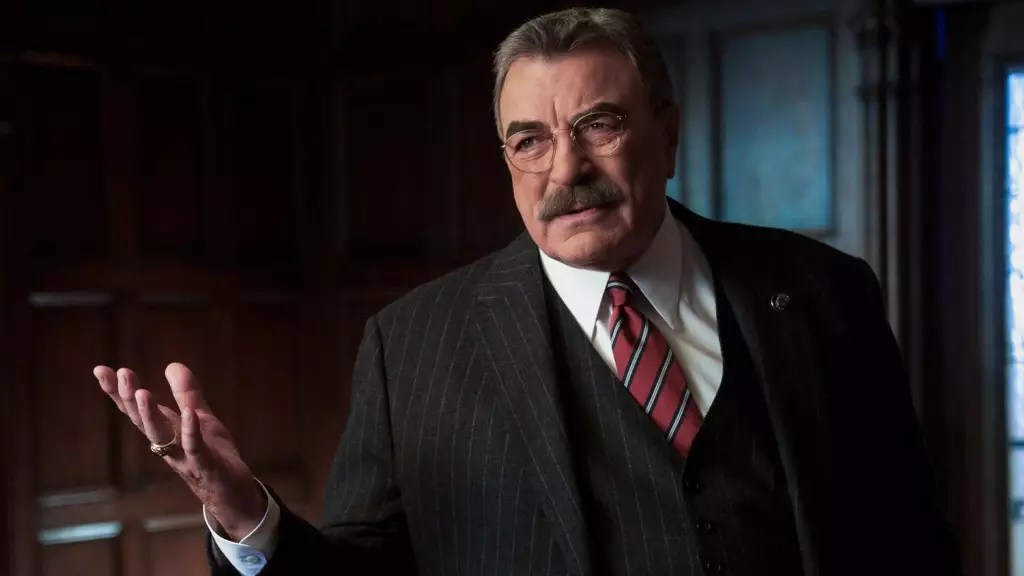After a stellar run spanning over fourteen years and nearly 300 episodes, CBS’s acclaimed police procedural drama “Blue Bloods” is preparing to say its final goodbyes. The series, which shines a light on the lives and traditions of the Reagan family—a dynasty deeply embedded in law enforcement—has become a pillar of the CBS lineup since its debut on September 24, 2010. However, with its impending cancellation, many are left to ponder the reasons behind this abrupt end, even as the show’s popularity remains robust.
Tom Selleck, the charismatic actor who has famously embodied NYPD Police Commissioner Frank Reagan, has not shied away from expressing his disappointment regarding the cancellation. In a candid interview with TV Insider, Selleck labeled his feelings as “frustrated” and remarked on the general oversight felt towards the series, suggesting that “Blue Bloods” has been continuously taken for granted by network executives. This sentiment echoes a common theme in television, where long-running shows, regardless of their viewership success, are often prematurely shelved, leaving both creators and fans in a lurch.
Intriguingly, “Blue Bloods” has consistently performed well in terms of ratings, averaging 8.1 million viewers in a fragmented television landscape dominated by streaming services and competitive programming. It has consistently ranked among the top scripted shows, and last season, it even cracked the Top 10, excluding football-related broadcasts. Despite these impressive statistics, the show is poised for termination, likely due to the financial implications tied to maintaining a long-running series—a harsh reality in the evolving entertainment ecosystem.
Selleck’s commentary on the situation presents a mixture of disappointment and acceptance. He expressed a desire for the show to continue its successful trajectory, pondering the absurdity of a network deciding to dispose of a guaranteed winner. “If you were to say to the television network, ‘Here’s a show you can program in the worst time slot you got, and it is going to guarantee you winning Friday night for the next 15 years,’ it would be almost impossible to believe,” he stated, highlighting the irony of the situation.
However, amid these feelings of frustration, there is also a palpable sense of nostalgia. Selleck reminisced about the end of the filming process, noting how surreal it felt to realize there would be no more Monday rehearsals following the conclusion of shooting the final episode. This introspective moment underscores the emotional toll that cancellation can take—not just on the audience but on actors who have committed years to their craft and to characters that have become synonymous with their identities.
The cancellation announcement has not been without counter-arguments; cast members have voiced their desire to keep the show alive. They have rallied in hopes of persuading CBS to reconsider, and during a press conference, CBS Entertainment president Amy Reisenbach confirmed the finality of the decision while expressing admiration for the cast’s dedication. “All shows have to come to an end,” she emphasized, offering the typically corporate justification for such a decision: the need to refresh programming schedules.
As fans prepare to bid farewell to the Reagan family and their tumultuous yet heartwarming tales of law enforcement and family dynamics, it is essential to consider what “Blue Bloods” will leave behind. Beyond its captivating storylines and robust character development, the show provided a unique portrayal of familial bonds interwoven with the complexities of police work, thus reflecting a side of life that resonates deeply within American society.
Ultimately, the story of “Blue Bloods” encapsulates a blend of triumph and disappointment. While Selleck and the cast may feel frustrated by the show’s untimely departure, they are also part of a significant piece of television history that will not be easily forgotten. The question lingers: will network executives truly prioritize quality programming over fiscal concerns in the future? As viewers and enthusiasts of the genre, we can only hope that lessons learned from the legacy of “Blue Bloods” will inform better decisions leading forward.


Leave a Reply